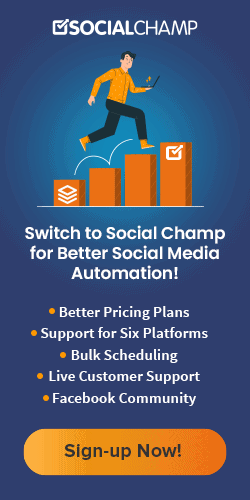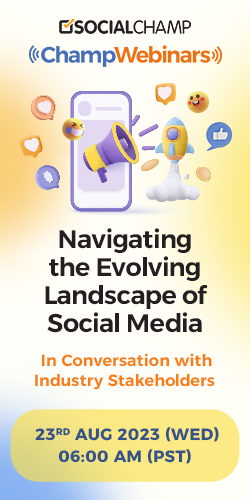Do you know that 82% of B2B marketers say they have found their greatest success on LinkedIn, yet many businesses struggle with posts that fail to gain traction?
So, how do you create content that actually performs?
The key is a clear LinkedIn content strategy.
Brands that post weekly see engagement rates double, proving that consistency and the right plan make all the difference.
In this guide, we’ll walk you through simple steps to build a strategy that boosts engagement, drives leads and grows your presence.
Plus, to make your LinkedIn experience even smoother, consider using Social Champ’s Social Inbox feature.
This comprehensive tool allows you to manage LinkedIn messages alongside your other social media platforms, making it easier to engage with your audience and respond promptly.
Now let’s get started!

Master Your LinkedIn Marketing with Social Champ!
Automate your posts, track performance, and engage with your audience effortlessly Start your 14-day free trial—no credit card required!
Short Summary
- LinkedIn is no longer just for networking—it’s essential for content marketing, lead generation, and brand building.
- A successful LinkedIn content strategy requires setting clear goals, understanding your audience, and consistently posting valuable content.
- Social Champ simplifies LinkedIn management with scheduling, analytics, and content curation features, saving you time.
- Key steps to an effective strategy include defining goals, knowing your audience, creating quality content, and engaging with followers.
- Regular analysis is crucial to track performance and adjust your approach for better results.
What Is a LinkedIn Content Strategy?
At its core, a LinkedIn content strategy is a roadmap that outlines how to create, share, and manage content on LinkedIn to meet specific business objectives.
Whether your goal is to build brand awareness, generate leads, foster professional relationships, or establish yourself as an industry expert, having a well-defined strategy ensures your efforts are focused and consistent.
A successful LinkedIn content strategy includes defining clear goals, understanding your target audience, crafting valuable content, and engaging regularly with your connections.
This strategic approach enables businesses and professionals to leverage LinkedIn’s powerful features and tools to drive results.
How Does Content Strategy for LinkedIn Work?
A successful content strategy on LinkedIn revolves around creating tailored content that not only engages your target audience but also aligns with your business objectives.
Whether your goal is to establish thought leadership, build brand awareness, or generate leads, the key lies in offering value-driven content that solves your audience’s problems.
What Content Should You Share on LinkedIn?
On LinkedIn, the content you share should reflect your professional expertise and provide value to your network.
This can include thought leadership articles, industry insights, how-to guides, short status updates, and engaging videos.
To maintain engagement, diversify the types of content you share:
- Industry insights: Keep your audience informed about trends and developments.
- How-to guides: Provide actionable steps for solving common problems.
- Native videos: Behind-the-scenes content or expert tips get more reach.
- Polls: Create quick, interactive content that sparks discussions. Offering a variety of content types keeps your audience engaged and highlights your expertise.
Strengthening Connections With Your Audience
Building strong relationships on LinkedIn starts with active engagement.
Rather than just posting content, spend time interacting with your network by commenting on posts, joining relevant discussions, and responding to messages.
Consistently providing valuable input in conversations helps position you as a reliable source of knowledge.
Moreover, tagging others, giving shoutouts, and acknowledging your connections’ achievements can foster goodwill and strengthen relationships over time.
Regular, meaningful interactions build trust and deepen connections with your audience.
Turning LinkedIn Into a Lead Generation Tool
LinkedIn can be a powerful platform for lead generation when used strategically.
To attract potential clients or partners, focus on creating content that addresses specific industry challenges while showcasing your expertise.
Offering free resources like downloadable guides, whitepapers, or exclusive webinars can help capture leads and expand your network.
Additionally, optimizing your profile with a strong call-to-action and clearly defined services makes it easier for potential leads to reach out and inquire about your offerings.
Featured Article: How to Get More Views on TikTok in 2025: Tools, Benefits, and Powerful Hacks
Why LinkedIn Is Essential for Your Business
LinkedIn is a vital tool for both B2B and B2C businesses looking to increase their reach, credibility, and influence in their respective industries.
In fact, LinkedIn is 277% more effective at generating leads than Facebook or Twitter.
With this platform, you’re engaging with a professional audience that has purchasing power and is actively seeking valuable insights and solutions.
This makes LinkedIn the perfect place to position yourself as a thought leader and generate business opportunities.
Some key reasons why LinkedIn is essential for your business include:
- Brand Visibility and Exposure: LinkedIn allows you to showcase your brand to industry leaders, potential clients, and partners. By regularly sharing high-quality content, you increase your brand’s visibility and establish authority in your niche.
- Lead Generation: LinkedIn is one of the most effective platforms for B2B lead generation. With tools like LinkedIn Marketing Solutions, you can target specific audiences based on job title, industry, location, and more, ensuring your message reaches the right people.
- Building Trust and Authority: By sharing valuable insights and engaging with your audience, you can build a reputation as an industry expert. Thought leadership posts, case studies, and how-to guides can position your brand as a trusted source of information. Additionally, if you embed a LinkedIn feed on your website it helps showcase your expertise and reinforces your authority.
With features like LinkedIn Marketing and LinkedIn Pulse, businesses can use LinkedIn not just for networking, but for driving brand growth and securing leads.
Steps to Build a Winning LinkedIn Content Strategy
Creating a robust LinkedIn content strategy requires careful planning and execution.
Follow these steps to build a strategy that works for your business:
Step 1: Define Your Goals
The first step in developing a winning LinkedIn strategy is defining your goals. What do you want to achieve on LinkedIn? Common goals include:
- Increasing brand awareness
- Driving website traffic
- Generating leads
- Building authority and thought leadership
- Engaging with potential clients

Setting specific, measurable goals allows you to align your content efforts with clear outcomes. For example, you might aim to increase your follower count by 20% in six months or generate 50 qualified leads from LinkedIn over a quarter.
Make sure your goals are SMART (Specific, Measurable, Achievable, Relevant, and Time-bound). This ensures you have clear metrics for success and can track progress over time.
Featured Article: Schedule LinkedIn Posts in 2025: Essential Tools, Advantages, and Detailed Comparisons
Step 2: Know Your Audience
Understanding your audience is critical to creating content that resonates with them. On LinkedIn, your audience may consist of industry professionals, decision-makers, clients, or potential employees.
- Research their pain points: What are the main challenges or issues your audience is facing in their industry? Address these in your posts.
- Understand their content preferences: Are they more likely to engage with long-form articles, short posts, videos, or infographics?
- Leverage LinkedIn’s audience insights: Use LinkedIn’s native analytics or Social Listening tools to gain insights into what your audience is talking about and engaging with.

By thoroughly researching your audience, you’ll be better equipped to create content that speaks to their interests and needs.
Step 3: Plan Your Content
Content planning is a critical component of a successful LinkedIn strategy. A well-thought-out content calendar ensures consistency and prevents last-minute scrambles for ideas.
- Use a variety of content formats: LinkedIn supports multiple types of content, including blog posts, infographics, videos, and SlideShares. Mix up your content to keep your audience engaged and offer value in different formats.
- Focus on thought leadership: Sharing original insights, industry trends, and expert opinions can establish you as a leader in your field. Utilize LinkedIn Pulse to publish long-form articles.
- Use a posting schedule: Posting consistently is key to maintaining visibility on LinkedIn. Use tools like Post to All Social Media at Once or LinkedIn Post Scheduler to automate and plan your posts in advance.
A content calendar also allows you to map out key topics and themes for each month, ensuring you remain relevant and timely in your posts.
Step 4: Create High-Quality Content
When creating content for LinkedIn, quality should always take precedence over quantity. High-quality content builds trust, drives engagement, and encourages shares.
- Be Educational: LinkedIn users are primarily professionals looking to expand their knowledge and improve their skills. Share educational content, such as industry reports, how-to guides, and expert opinions, to add value to your audience.
- Incorporate Visuals: Posts with images, videos, or infographics receive higher engagement than text-only posts. Consider using tools like Canva or Visme to create visually appealing content.
- Be Authentic: Authenticity is key to building relationships on LinkedIn. Share personal experiences, behind-the-scenes looks, or case studies to build a deeper connection with your audience.

Step 5: Optimize Your LinkedIn Profile
Before you start sharing content, ensure your LinkedIn profile is optimized to reflect your brand or business. A well-optimized profile helps build credibility and encourages people to connect with you.
- Profile Picture and Banner: Use a professional profile picture and a custom banner that reflects your brand identity.
- Headline and Summary: Write a clear, concise headline that communicates what you do and who you help. In the summary, highlight your key achievements and what makes you stand out.
- Experience and Skills: Showcase your professional experience, accomplishments, and skills to establish credibility.

An optimized profile helps ensure that visitors to your page know exactly what your brand stands for and why they should engage with you.
Step 6: Engage With Your Audience
Engagement is crucial to building a strong presence on LinkedIn. It’s not enough to post regularly—you need to actively engage with your audience by responding to comments, participating in discussions, and connecting with others.
- Respond to Comments: Engage with users who comment on your posts. Responding to comments encourages further interaction and builds a sense of community.
- Participate in LinkedIn Groups: Join relevant industry groups and participate in discussions to grow your network and position yourself as an expert.
- Message Your Connections: Use Social Champ’s Inbox feature to manage messages across LinkedIn and other social platforms in one place.

Step 7: Analyze and Adjust
No content strategy is complete without regular analysis and adjustments. Measuring your performance allows you to understand what’s working and what’s not, so you can optimize your strategy over time.
- Track Key Metrics: Monitor important LinkedIn metrics like post engagement, follower growth, and website traffic.
- Use Analytics Tools: Tools like Social Champ offer in-depth analytics, helping you evaluate post performance and audience engagement.
- For example, using Social Listening can help you track relevant conversations and identify trending topics that are important to your audience. This can inform the kind of content you create, ensuring it resonates and drives engagement.

By consistently analyzing your content and making adjustments, you can improve your LinkedIn strategy and continue to grow your presence on the platform.
Featured Article: How Often Should You Post YouTube Shorts to Maximize Views
Leveraging Social Champ for LinkedIn Success
Managing a LinkedIn content strategy can be overwhelming, especially when you’re juggling multiple social media platforms.
Social Champ simplifies this process by offering a comprehensive tool that streamlines your LinkedIn marketing efforts.
Here’s why Social Champ is a must-have for your LinkedIn content strategy:
Efficient Scheduling
Staying consistent on LinkedIn is crucial for building engagement and growing your network, but manually posting every day can be time-consuming.
With Social Champ, you can plan and schedule your LinkedIn posts well in advance.
This means you can map out an entire content calendar, freeing up time for other important tasks while maintaining a steady presence.
Whether you’re scheduling a week’s worth of posts or planning for the next month, Social Champ ensures that your content goes live when it’s most effective, without any manual intervention.

Take Full Control of Your LinkedIn Content.
Whether managing personal or company profiles, keep your content consistent and impactful to drive meaningful engagement. Start today and stay ahead of the competition!
Advanced Analytics
Understanding how your content is performing is key to refining your strategy.
Social Champ’s analytics feature offers detailed insights into post performance, allowing you to track important metrics such as engagement rates, clicks, shares, and follower growth.
With this data at your fingertips, you can quickly identify which types of content resonate best with your audience and adjust your approach accordingly.
Content Curation
Keeping your LinkedIn feed active with fresh, engaging content can be a challenge.
Social Champ’s content curation tools make it easy to discover and share valuable articles, industry news, and other content that your audience will appreciate.
By mixing curated content with your original posts, you can keep your feed dynamic, ensuring that you stay relevant and provide value to your connections.
Team Collaboration
If you manage your LinkedIn content as part of a team, Social Champ offers robust collaboration features that make teamwork seamless.
You can assign tasks, review scheduled posts, and collaborate on content creation without any confusion.
Team members can work together to refine posts, ensuring that your messaging is consistent and aligned with your overall strategy.
Integrating Social Champ into your LinkedIn content strategy not only saves time but also helps you work smarter, automate routine tasks, and achieve better results.
With features designed to help you stay organized, track progress, and engage effectively, Social Champ is the ultimate tool to elevate your LinkedIn game.
Conclusion
In 2024, having a strong LinkedIn content strategy is essential for businesses and professionals looking to grow their brand, engage with their audience, and generate leads.
By following the steps outlined in this guide—setting clear goals, understanding your audience, creating valuable content, and using tools like Social Champ—you can build a strategy that delivers results.
Remember, consistency and engagement are key to success on LinkedIn.
With the right plan and tools in place, you’ll be well on your way to becoming a LinkedIn powerhouse.
Ready to elevate your LinkedIn strategy?
Start your free trial with Social Champ today and unlock the tools you need to manage your LinkedIn content like a pro.


















